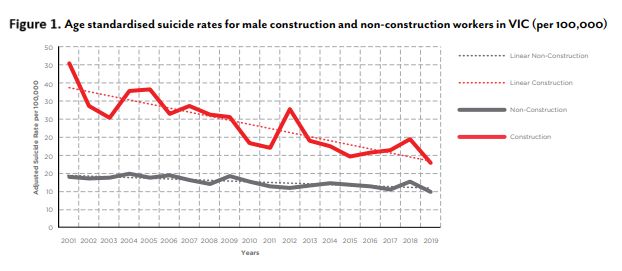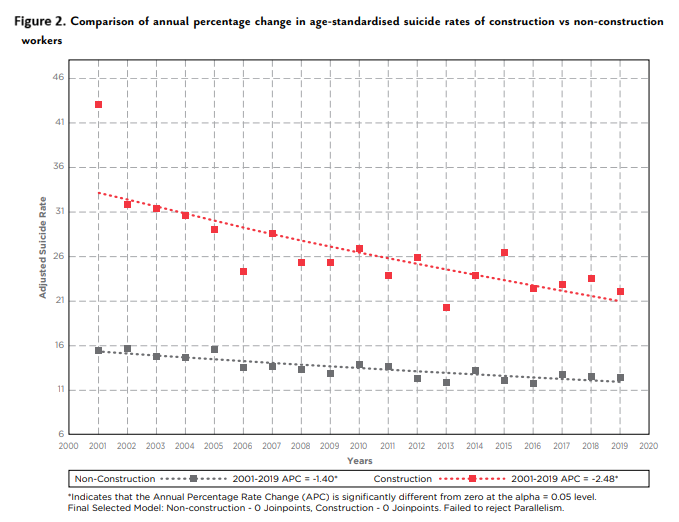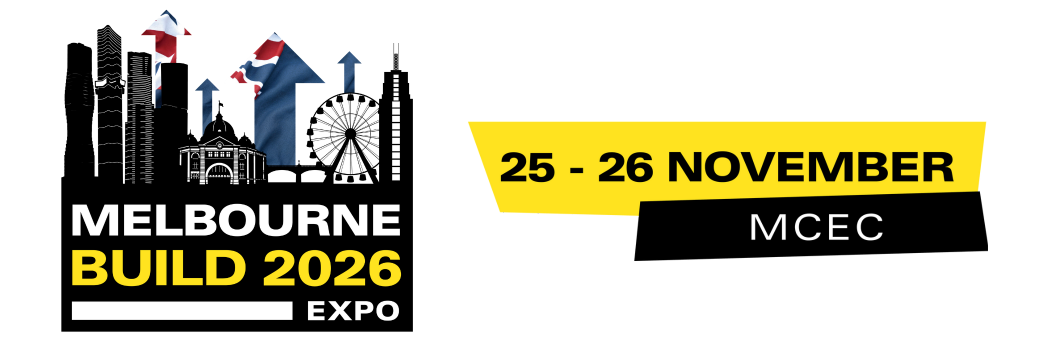Prioritising Mental Health in Construction: How can we build mental health awareness?
)
*Disclaimer: This article discusses sensitive topics related to suicide and depression. If you or someone you know is struggling, please seek professional help or contact a mental health organisation. Resources are available at the end of this article.*
The issue of mental health in the construction industry is not just a statistic; it's a crisis that demands our attention. The construction sector, unfortunately, ranks among the industries with the highest suicide rates. Construction workers are eight times more likely to die from suicide than from workplace accidents. Alarmingly, young workers are well over two times more likely to take their own lives than their peers in other professions.
This stark reality highlights a critical problem. While the construction industry plays a vital role in the Australian economy and society, it is also fraught with unique pressures that can compromise the mental well-being of its workforce. Long hours, job insecurity, and a culture that often stigmatises vulnerability contribute to an environment where mental health struggles can go unaddressed. Despite recent changes, the issue persists, and stigmas surrounding mental health continue to endure — and it is costing lives.
In this article, we aim to provide a platform for voices from within the industry. We will hear from someone who has faced these challenges first-hand and is now committed to fostering open conversations about mental health in construction. Together, we can work towards creating a safer and healthier environment for all workers.
 About Shaun Dawson
About Shaun Dawson
Shaun is a Safety Coordinator and Senior Operator in the rail and civil construction industries, based in Victoria. He works for Galco Group, where he helps out with both operations and safety initiatives on and off site. With over a decade of hands-on experience and a strong focus on safety and culture, he has become deeply committed to mental health advocacy in our sector.
Shaun outlines where his dedication to supporting mental health in construction originated, sharing “eight years ago, I suffered a panic attack while working on site. I had just returned to Melbourne after living in Canada for four years and was under immense pressure trying to re-establish myself in the industry I had previously left.”
He explains, “That experience left a lasting mark on me, and ever since, I’ve worked to create environments where people feel supported, not discarded, when they’re struggling.”
Shaun is currently completing his Mental Health First Aid training so he can better support those around him and help point them in the right direction when they need it. “I believe every worker deserves to feel safe — both physically and mentally — and I’m passionate about driving real cultural change across the industry”, he said.
The Unique Challenges of Working in the Construction Industry
Mental health issues in the construction industry are a pressing concern, underscored by alarming statistics. According to the MATES in Construction Industry Round Table report, about 8.1% of the population—approximately 62,000 individuals—are affected by suicide annually. Construction workers, particularly labourers, face significantly elevated suicide rates compared to other professions (see Figure 1 below).

Looking at the numbers for depression and anxiety in the industry, the Front Public Health Report 2023, found that “Two out of five construction workers suffer from depression and experience trait anxiety. More seriously, three out of five workers show alcohol-use problems that require clinical attention” (Frontiers in Public Health). These alarming statistics highlight the urgent need to promote a better understanding of mental health in the construction sector.
But where do these mental health issues originate? The construction industry faces unique challenges that set it apart from other sectors. To gain insight, we asked Shaun about the specific difficulties workers encounter.
“Construction workers often operate under high physical and mental stress — long hours, shift work, pressure to meet deadlines, and working in remote or isolated conditions are all common”, he said.
To add on to this, workers also endure harsh physical environments, including extreme heat, hazardous chemicals, and high noise levels. They navigate high cognitive demands, operating complex machinery and communicating with various stakeholders. Additionally, the risk of safety incidents and exposure to traumatic events, such as serious injuries or fatalities, contribute to anxiety. Job insecurity due to the project-based nature of work further exacerbates stress, highlighting the urgent need for targeted mental health support in this sector. However, the mindset of the workforce can also contribute to a challenging work environment.
Shaun says this “can prevent people from speaking up when they’re struggling”. This highlights the need to de-stigmatise mental health discussions within the industry. Encouraging open conversations about mental well-being can empower workers to seek help and support each other, fostering a healthier work environment.
“On top of that, work-life balance can be incredibly hard to maintain. Many of us are juggling intense workloads while trying to be present for our families. The guilt of missing key moments at home or feeling like you’re constantly choosing between work and loved ones adds another layer of emotional strain.”
Shaun shares, “Personally, I’ve experienced the fatigue and burnout that come with trying to balance operational demands with safety responsibilities. I’ve seen mates hide anxiety behind humour or push through grief because there was 'no time' to process it. The expectations to stay strong and reliable can become a silent burden — and if you're not careful, it builds up until something gives.“
Prioritising Mental Health and Well-Being Among Employees in the Construction Industry
Given the unique challenges faced in the construction industry, there is a pressing need for companies to promote mental health. Shaun shares that every organisation, regardless of size, can foster a culture where individuals feel comfortable discussing their mental well-being.
“Our organisation is relatively small compared to some, but that doesn’t mean mental health takes a back seat — in fact, it makes the personal connections even more important. Because we work closely together, there’s a real opportunity to create a culture where people genuinely look out for one another.”
“As part of my role, I advocate for early conversations, supportive check-ins, and training to help recognise signs of mental strain. While we still have a long way to go, I’ve been developing clearer policies and implementing regular talks that cover mental health topics — not just physical safety. We may not have a full-time HR department or large-scale wellness programs, but we’re building a culture where it’s okay to ask, ‘Are you doing alright?’ — and actually mean it. I also encourage other team members to share their own experiences (if they are comfortable to do so) to normalise the conversation and help remove the stigma.”
Advocating for early conversations and supportive check-ins is crucial in promoting mental health within the construction industry. By developing clear policies and encouraging open discussions about mental well-being, organisations can create a culture where asking “Are you doing alright?” becomes a meaningful practice, helping to normalise conversations and reduce stigma.
A Recent Change Reducing Stigma Around Mental Health
Recent studies indicate that suicide mortality has decreased among both construction workers and non-construction workers (see Figure 2), yet a disparity still persists within the construction industry.

Shaun noticed this recent change, saying “there’s definitely been a cultural shift. Five or ten years ago, mental health was rarely mentioned. Now, organisations are starting to realise that safety isn’t just physical — it’s psychological too”.
But, what further steps can be taken to enhance this positive trend?
Shaun shares, “Reducing stigma begins with leadership. When people in senior roles speak openly and authentically, it gives others permission to do the same.”
“Education is also key: not just about crisis support, but teaching people how to manage stress, build resilience, and support their coworkers in a real way. We need to move from reactive conversations to proactive ones — making mental health part of everyday site talk, not something reserved for when things go wrong.”
Help is Available: Resources and Support Systems
Help is available for those facing mental health challenges in the construction industry. Many dedicated organisations are actively promoting support and resources tailored specifically for construction workers. These initiatives aim to foster a culture of understanding and assistance, ensuring that no one has to navigate their struggles alone. For more information on these valuable resources, please refer to the links provided at the end of this article.
Shaun outlined essential measures his organisation is implementing and recommended several supportive organisations that offer valuable assistance.
He said, “we promote the use of Employee Assistance Programs (EAPs) where available, and I personally try to bridge the gap by being a confidential point of contact for anyone who needs to talk”.
“We’ve also worked with Beyond Blue in the past, where a portion of the earnings from certain machines went directly to support their mental health initiatives — it was a great way to give back while raising awareness on site. We refer team members to organisations like MATES in Construction, Beyond Blue, and Lifeline”.
MATES in Construction focuses on improving mental health and suicide prevention within the construction industry through peer support programmes and training. Similarly, Beyond Blue is a national charity that raises awareness and provides resources for mental health challenges, while Lifeline offers 24/7 crisis support and intervention services to help individuals in distress. Together, these organisations play a vital role in fostering mental well-being and support in Australia.
Steps Toward a Supportive Work Culture in Melbourne’s Construction Industry
Shaun highlights that “change needs to be driven from both the top down and bottom up. Employers must treat mental health as part of their core safety systems — not just a side initiative. That means including it in risk assessments, onboarding, training, and even performance reviews”.
“At the same time, we need to empower workers to speak openly, check on their mates, and know they won’t be judged or penalised for doing so. Mental health needs to be part of everyday site culture — as normal as wearing a hard hat or filling out a pre-start.”
To summarise, mental health in the construction industry is a critical issue that demands our collective attention. The stark reality of high suicide rates among construction workers highlights the urgent need for support and open dialogue. As Shaun Dawson poignantly states, a truly supportive culture is one where people feel safe to be human — where asking for help is seen as strength.
We extend our heartfelt thank you to Shaun for sharing his experiences and recommendations, which serve as a crucial guide for promoting mental well-being in the industry. Looking ahead, it is essential for organisations to integrate mental health into their core safety practices, encouraging open conversations and providing resources that empower workers to seek help. Together, we can create a healthier, more resilient construction workforce.
What YOU can do today to support mental health within the construction sector:
-
Encourage Open Dialogue: Help break the stigma by discussing mental health openly.
-
Check In with Colleagues: Ask how your coworkers are doing and foster those conversations.
-
Support Mental Health Organisations: Research and contribute to organisations like MATES in Construction, Beyond Blue, and Lifeline.
-
Get Trained: Take the initiative to complete Mental Health First Aid training, just like Shaun!
Support is Here — Get Help:
-
Lifeline Australia – 13 11 14
-
VIC Suicide Help Line – 1300 651 251
-
Beyond Blue - 1300 22 4636
-
MensLine Australia – 1300 78 99 78
-
Suicide Call Back Service – 1300 659 467
-
Kids Helpline (for under 25s) – 1800 55 1800
-
Mates in Construction – 1300 642 111
Sources:
-
Shaun’s Socials: https://www.linkedin.com/in/shaun-dawson-356985220/
-
MATES in Construction: https://mates.org.au/construction/the-problem, https://mates.org.au/construction/, http://mates.org.au/media/documents/MIC-QLD-construction-industry-roundtable-report.pdf, https://mates.org.au/media/documents/Rockwood-Weir-Industry-Report-2025.pdf
-
Safework: https://www.safework.nsw.gov.au/__data/assets/pdf_file/0020/1037342/mental-health-in-construction-fact-sheet.pdf, https://www.safework.nsw.gov.au/about-us/evaluation/findings-report-mental-health-in-construction-2024
-
Frontiers in Public Health: https://pmc.ncbi.nlm.nih.gov/articles/PMC10372223/
-
MONASH University: https://www.monash.edu/medicine/news/latest/2020-articles/monash-university-report-identifies-occupations-with-greater-risk-of-suicide
Join our Mental Health in Construction Ambassador Programme, like Shaun, and become a catalyst for change! You'll have the chance to network with over 10,000 attendees and connect with fellow ambassadors to share insights on best practices, innovative approaches, and effective strategies for promoting mental well-being in the industry. Together, we can create a supportive community that prioritises mental health and fosters resilience among construction professionals. You can make a meaningful impact – become an ambassador today!
Melbourne Build is the leading and largest construction trade show for Melbourne and Victoria, taking place October 22nd & 23rd 2025 at MCEC. Featuring two jam-packed days of knowledge-sharing, 300+ expert speakers across 12 conference stages, a 175+ booth exhibition, Meet the Buyers, business networking, live music, entertainment and so much more! Don’t miss out on free tickets.

